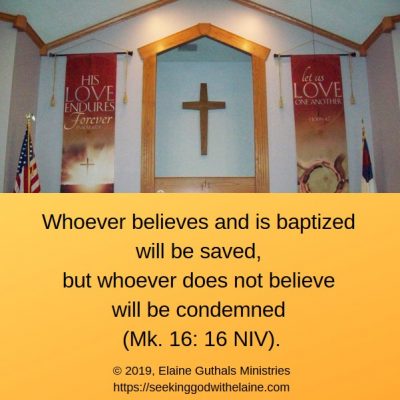Now faith is the assurance of things hoped for, the conviction of things not seen.
Hebrews 11: 1
Scripture: Hebrews 11
Churchy terms can sometimes be confusing. For instance, how is faith different than trust? This devotion, the first in the How Is Faith Different Than Trust series, looks at what faith is.
Nuggets
- Faith is belief.
- Doubt detracts from faith.
- Believers gain much when they have faith.
- People who do not have faith in God suffer consequences.
- Even though believers are called to live by faith, that does not guarantee believers will have easy journeys.

In researching a previous post, the question popped into my mind as to how faith is different than trust. Are they different? Are they interchangeable?
The answers that I came up with are too long for one devotion. For this devotion, we will look at faith. In the next devotion, we will look at trust and consider both terms.
Let's Put It into Context
The object of our faith and trust is God. “And when he did come, it was to lead you to have faith in God, who raised him from death and honored him in a glorious way. This is why you have put your faith and hope in God.” (I Pet. 1: 21 CEV).
According to the Smith’s Bible Dictionary, faith is “the assent of the mind to the truth of God’s revealed will.” Faith is the central concept of Christianity.
Faith Is a Belief
Faith is described by beliefs, a.k.a., the assent of the mind. It is the gateway to salvation. “For it is by grace you have been saved, through faith — and this is not from yourselves, it is the gift of God” (Eph. 2: 8 NIV).
Belief in God opens the way to incredible things. “…’If You can? Everything is possible to the one who believes” (Mk. 9: 23 HCSB). Through this belief, we can overcome the world (I Jn. 5: 4-5) and secure eternal life (I Jn. 5: 13).
Many people were healed by Jesus because of their faith. Jesus told the centurion that his servant would be healed because he had believed (Mt. 8: 13). The friends that brought the man sick with palsy and dropped him through the roof had their faith recognized by Jesus (Mt. 9: 2).
Faith is a choice. “ I have chosen the way of faithfulness; I have set my heart on your laws” (Ps. 119: 30 NIV). We make the choice even though we can’t see (II Cor. 5: 7) — we can’t see God, we weren’t alive when Jesus walked the earth. We choose to stand firm (I Cor. 16: 13).

Faith Is Not Doubt
Doubt detracts from faith. “… I tell you the truth, if you have faith and don’t doubt, you can do things like this and much more. You can even say to this mountain, ‘May you be lifted up and thrown into the sea,’ and it will happen.” (Mt. 21: 21 NLT).
The Bible gives us a good image of doubt. “But when you ask, you must believe and not doubt, because the one who doubts is like a wave of the sea, blown and tossed by the wind” (Jas. 1: 6 NIV).

Faith Has Benefits
We gain so much when we have faith. We gain patience (Jas. 1: 3-4).
When we ask in faith, our prayers are answered (Mk. 11: 24). This faith can be small. “… I tell you the truth, if you had faith even as small as a mustard seed, you could say to this mountain, ‘Move from here to there,’ and it would move. Nothing would be impossible” (Mt. 17: 20 NLT).
Belief also allows us to see the glory of God. “Then Jesus said, ‘Did I not tell you that if you believe, you will see the glory of God?’” (Jn. 11: 40 NIV). We also see His glory as He shields us by His power (I Pet. 1: 5). Because of His power, we do not have to rely on worldly wisdom (I Cor. 2: 5).
Faith brings assurance. “Let us draw near to God with a sincere heart and with the full assurance of faith brings, having our hearts sprinkled to cleanse us from a guilty conscious and having our bodies washed with pure water” (Heb. 10: 22).
Lack of Faith Has It’s Consequences
While having faith provides benefits, the lack of faith presents consequences. “Whoever believes and is baptized will be saved, but whoever does not believe will be condemned” (Mk. 16: 16 NIV).

We’ve talked in a previous devotion what the consequences would be when Jesus returned. We will either be rewarded or repaid, depending on whether we have asked Him to be our Redeemer, Lord, and Savior.
Faith Doesn’t Make Things Easy
Having faith doesn’t mean we are going to have an easy go of it. “But you must resist the devil and stay strong in your faith. You know that all over the world the Lord’s followers are suffering just as you are” (I Pet. 5: 9 CEV). That faith will be put to the test (I Pet. 1: 7).
This is kind of a scary verse. “Anyone who is destined for prison will be taken to prison. Anyone destined to die by the sword will die by the sword. This means that God’s holy people must endure persecution patiently and remain faithful” (Rev. 13: 10 NLT).
Testing of our faith, however, produces persistence and endurance. “You know you learn to endure by having your faith tested ” (Jas. 1: 3 CEV).
Still, we are called to live by faith. “So that it is no longer I who live, but it is Christ who lives in me. This life that I live now, I live by faith in the Son of God, who loved me and gave his life for me” (Gal. 2: 20 GNT). Living by faith will lead us to live a righteous life (Rom. 1: 17).
We have to pursue faith: “… pursue righteousness, godliness, faith, love, endurance and gentleness” (I Tim. 6: 11 NIV).
When we live a life of faith, we are promised provision. “Then Jesus declared, “I am the bread of life. Whoever comes to me will never go hungry, and whoever believes in me will never be thirsty” (Jn. 6: 35 NIV). We are not thirsty because belief in Him causes the living water He provides to flow in us (Jn. 7: 38).
In What Do We Have Faith?
We believe and have faith in the following:
- That God, the Creator of the universe, is our Father Who wants to have a relationship with His people.
- That God sent His Son Jesus to be the Redeemer of mankind.
- That the Trinity, which consists of God as Father, Son, and Holy Spirit, are three different forms of the same Being.
- That Jesus was born of a virgin, making Him 100% God and 100% man.
- That Jesus gave His life on the cross for us so that His blood could pay the price for our sins.
- That because of God’s great might and power, Jesus rose from the grave, conquering death and paying the price for our sins.
- That at some point, Jesus is going to come back to earth and take believers home with Him.
To read Does Believe or Repent Come First?, click the button below.
If you have not admitted that your relationship is not right with God,
have not asked Jesus to be your Lord and Savior,
and have not confessed your sins,
please read through the Plan of Salvation and prayerfully consider what God is asking you to do.
Father. You have called believers to be people of faith. You want us to believe in You and what You have done for us. Lord, we do believe. We thank You that You sent Your Son to be our Redeemer. Bu His doing that, our relationship with You was restored. Help us to grow stronger in our faith daily. Amen.
What do you think? What is your definition of faith? What are your core statements of faith?
Leave me a comment below (about this or anything else) or head over to my Facebook group for some interactive discussion.
If you don’t understand something and would like further clarification, please contact me.
If you have not signed up for the email daily or weekly providing the link to the devotions and the newsletter, do so below.
If God has used this devotion to speak with you, consider sharing it on social media.
Pingback: How Is Trust Different Than Faith? – Seeking God with Elaine
Pingback: How Can God’s Power Change Us? – Seeking God with Elaine
Pingback: Why Aren’t God’s Promises Received Now? – Seeking God with Elaine
Pingback: The Power of One – Seeking God with Elaine
Pingback: The Witness of the Spirits – Seeking God with Elaine
Pingback: Evaluating Our Evil Thoughts – Seeking God with Elaine